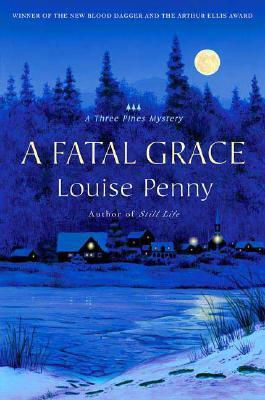Review: "A Fatal Grace" by Louise Penny
- Claire Quarterman

- Sep 4, 2023
- 2 min read

Quick Summary
Type: Novel, book 2 in Chief Inspector Armand Gamache series
Genre: Mystery
Back Cover: "Welcome to winter in Three Pines, a picturesque village in Quebec, where the villagers are preparing for a traditional country Christmas, and someone is preparing for murder.
No one liked CC de Poitiers. Not her quiet husband, not her spineless lover, not her pathetic daughter—and certainly none of the residents of Three Pines. CC de Poitiers managed to alienate everyone, right up until the moment of her death.
When Chief Inspector Armand Gamache, of the Sûreté du Québec, is called to investigate, he quickly realizes he's dealing with someone quite extraordinary. CC de Poitiers was electrocuted in the middle of a frozen lake, in front of the entire village, as she watched the annual curling tournament. And yet no one saw anything. Who could have been insane enough to try such a macabre method of murder—or brilliant enough to succeed?
With his trademark compassion and courage, Gamache digs beneath the idyllic surface of village life to find the dangerous secrets long buried there. For a Quebec winter is not only staggeringly beautiful but deadly, and the people of Three Pines know better than to reveal too much of themselves. But other dangers are becoming clear to Gamache. As a bitter wind blows into the village, something even more chilling is coming for Gamache himself."
Read Time: 1 day
Rating: 4 stars
Review
Confession: As soon as I read the first sentence, I knew who the murderer was. Not the author's fault: I watched the TV show before I read the novel, and the first two episodes of the TV show are based on this book.
But once again, the character relationships were so compelling that I didn't mind that I had spoiled the mystery. I just really enjoyed reading the book.
I will say that the author had a bit of a fixation on weight and size that, at some points, felt a little uncomfortable, but with that exception, the mystery was well-crafted and the story well-told.
I did occasionally have a little trouble keeping names straight, and the references to Arnot's case confused me from time to time - I'm not sure if there are details I've forgotten from the first book, or if the details I'm missing are yet to come, but the overarching conflict of Arnot's case - which will be explored in the next books - was interesting, though any discussion of it frustratingly vague.
I also wish we had learned how L had gotten ahold of Clara's art, although I suppose the fact that we never learn plays into the 'meeting God in unexpected places' theme. If that's the case, however, I wish someone had told Clara because she really seems to need it.
Aside from the character relationships, the best thing about this novel was how well it made CC de Poitiers into such an awful person. Her characterization as an evil person was extremely well done.
I've already placed a hold for the next two books at the library; I'm looking forward to reading them.











Comments